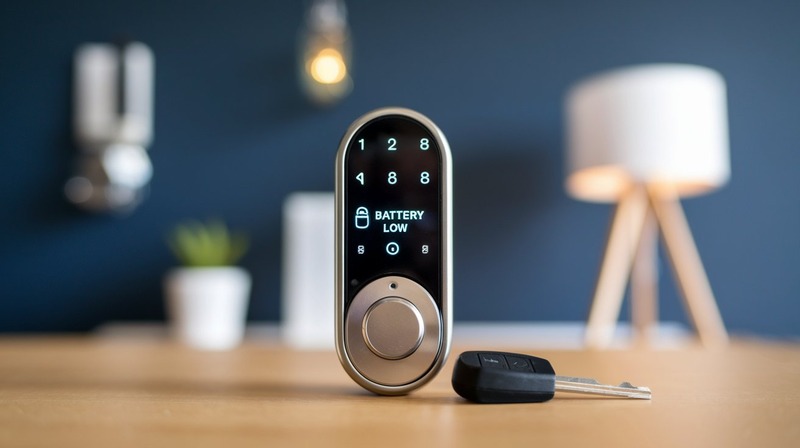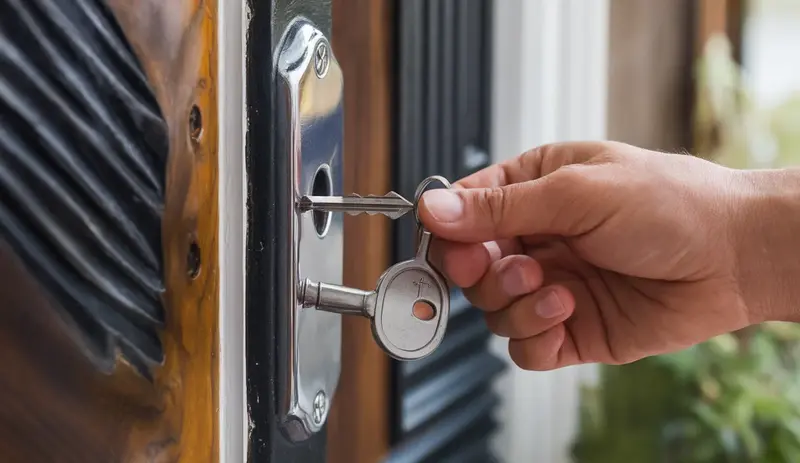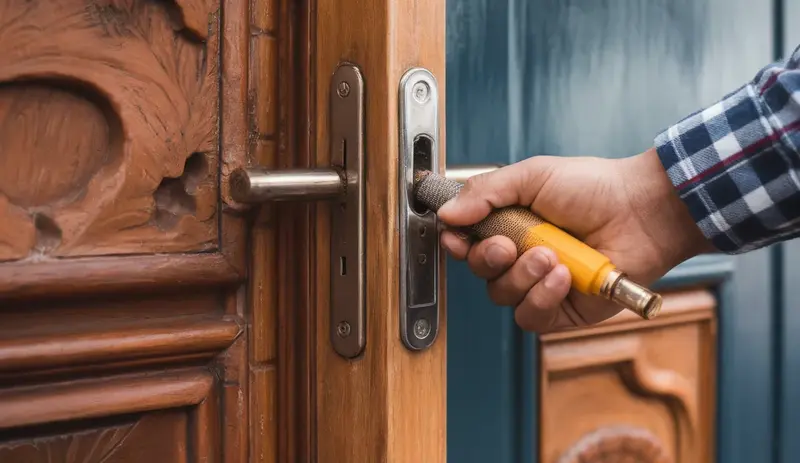
Picture this: You’re juggling grocery bags, your toddler is whining, and you’re desperately trying to unlock your front door. But instead of the usual smooth electronic click, nothing happens. Your smart lock’s screen is dark, and suddenly you’re staring at a potential home lockout nightmare.
Don’t panic. Smart lock battery issues happen to everyone, and I’m going to walk you through exactly what to do – step by step. Whether you’re tech-savvy or totally confused by smart home gadgets, this guide will save you from a major headache.
Warning Signs Your Smart Lock Battery is Dying
Let’s discuss battery problems. The majority of smart locks do a reasonably good job of alerting you prior to a total battery meltdown. Usually, you’ll start seeing low battery warnings show up in your lock’s mobile app. Think of this as your front door security system’s version of a battery indicator.
Another obvious indicator of low battery life is a delayed response. If you are seeing that your smart lock is taking longer than usual to recognize your fingerprint or respond to your digital key, it’s time to consider a battery change. Some locks are even more direct – they’ll start beeping periodically to remind you to change the batteries.
You May Like: How Secure Are Electronic Locks Compared To Traditional Ones?
Immediate Steps When Your Smart Lock Battery Dies
Don’t panic, first things first. Battery death is recognized as a top not-so-smart time for a smart lock to stop working, and manufacturers have built in multiple backup options to account for this. Your first and best option if your lock has gone totally unresponsive is to use the key that came with it. A physical key, what a concept. If that doesn’t work, and it probably will, look for other possible directive forces.
The majority of smart locks come equipped with an inconspicuous backup battery port. If you’re comfortable with technology, you can usually use a 9-volt battery to temporarily power your smart lock-essentially giving it a digital jump-start-so you can re-enter your home and replace the lock’s batteries.
How Different Smart Lock Brands Handle Battery Death
Most individuals don’t comprehend this: smart locks are not all equal. August, Schlage, and Yale have various emergency procedures from each other. Some give more notice during an undetermined battery situation, while others might be more speechless and just die.
For instance, take August locks. They tend to have very clear app notifications. Schlage, on the other hand, might rely more on physical indicator lights. Yale smart locks might offer the most straightforward backup systems.
They have clearly marked emergency power terminals that are easy for even non-technical users to access at our local service location.
Preventing Future Battery Emergencies
Dealing with a lockout is much harder than preventing one. Put reminders on your phone or calendar about when to change the batteries in your smart lock. They should last between 6 and 12 months, but it could be on the lower end for a busy household and definitely not an upper limit for one with a lot of lock-related activity.
And don’t wait to buy replacement batteries until you’re in that 6-12 month range. Batteries that stay in an always-ready state have a longer life, so use them as near to their expiration date as you can.
It is crucial to understand the battery life cycle of your specific lock. Some locks use more power than others, particularly advanced models that incorporate such features as fingerprint recognition or extensive connectivity.
When to Call a Professional?
Every so often, a lifeless battery has little to do with a lack of power. If your battery keeps dying or it seems the deadbolt is causing batteries to die in record time, it’s time to make an appointment with a smart home specialist locksmith.
They can get to the root of the problem and determine whether the issue is with the batteries or with the lock in a more complicated sense.
Some peculiar battery drain happenings might hint at more serious issues afoot – like endless attempts to connect, firmware gone wild, or a sensor that’s gone haywire. In such instances, consulting a pro can not only save you the hassle of dealing with a time-sucking problem but also spare you the expense of a failed fix and the potential security vulnerabilities that a holed-up device might let in.
Final Words
Battery issues don’t have to be a total disaster. With the right knowledge and a calm approach, you can handle smart lock battery problems like a pro. The key (pun totally intended) is staying prepared and knowing your options.
Pro Tips:
- Always keep your physical key as a backup
- Check battery levels monthly
- Don’t wait until the last minute to replace batteries
Final Takeaway: Smart locks are incredible technology, but they’re not perfect. A little preparation goes a long way in preventing unexpected lockouts.


